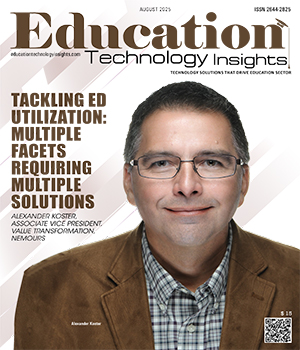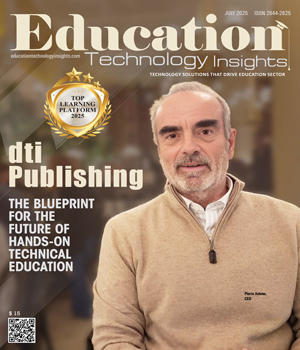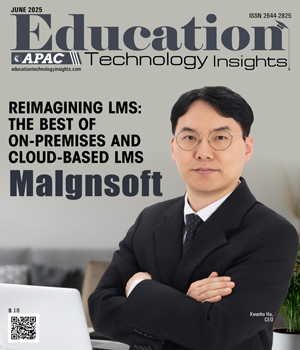THANK YOU FOR SUBSCRIBING
Be first to read the latest tech news, Industry Leader's Insights, and CIO interviews of medium and large enterprises exclusively from Education Technology Insights
Accelerating Skilling & Upskilling: The Micro-credential Revolution
Soula Chronopoulos, Vice President, Growth & Innovation and Hélène Fournier, Chief Learning Officer, LCI Education Network
Transforming to meet a market need Soula Chronopoulos, Vice President, Growth & Innovation and Hélène Fournier, Chief Learning Officer, LCI Education Network
Soula Chronopoulos, Vice President, Growth & Innovation and Hélène Fournier, Chief Learning Officer, LCI Education Network
If the current economic crisis has taught us anything, it’s that a skill that is useful today may become obsolete tomorrow. Government, academia, and industry are finally realizing this. To ensure business objectives are met, companies must include ongoing upskilling and reskilling in their workforce strategy. In addition, they must ensure lifelong learning strategies to retain employees with mission-critical competencies.
Rapid skilling strategies take center stage
The market for professional skills is booming. This new reality requires a new set of skills as well as the ability to quickly develop essential know-how in a rapidly changing landscape. In a recent report, IBM urges CEOs and executives to implement a “workforce management strategy to develop the talent of tomorrow.” The World Economic Forum predicts that one billion jobs will be displaced due to automation and the division of labor between humans and machines, and more than 50 percent of all employees will need to reskill and upgrade by 2025. This is just around the corner.
There is an unprecedented need for collaboration between academia and business to address this new reality and ensure the sustainable recovery of our economy.
“In the very near future, learning will become synonymous with revenue, with an increasing emphasis on demonstrated skills. This is a global trend that we cannot ignore, and Quebec must lead the way,” said Soula Chronopoulos, Vice President of Growth and Innovation at LCILX.
A recipe for economic growth already adopted by many
At the heart of this alliance between higher education and industry is the rapid acquisition of new skills and the reskilling of the population through short courses, or micro-credentials. Because these are highly targeted, employees can learn new skills on the job and be recognized for those skills through digital, validated, secure, transferable, and stackable badges.
For example, nationally, this model is highlighted by Microsoft’s Canada Skills program. By partnering with Canadian universities to deliver and validate certifications in data analytics, artificial intelligence and cloud computing, Microsoft is accelerating the entry of skilled employees into the Canadian economy, in a matter of weeks, by leveraging a micro-credential approach. IBM and Google are also developing professional learning programs, certified and recognized by post-secondary organizations, to develop a skilled workforce in their critical areas.
Micro-credentials meet direct credentialing: A dynamic duo
An effective micro-credentialing strategy aims to disrupt traditional training approaches by accelerating organizational development, recognizing, and validating competencies acquired through training and experience, and closing the increasing skills gap.
“The World Economic Forum predicts that one billion jobs will be displaced due to automation and the division of labor between humans and machines, and more than 50 percent of all employees will need to reskill and upgrade by 2025.”
A micro-credential is a short, personalized and often on-demand learning experience (or course) that helps learners develop a range of skills and competencies. Typically, a micro-credential is completed over several days or weeks leading to certification upon completion. This is a course path for individuals who need to fast-track the acquisition of new skills.
• Businesses can choose to build their own micro-credentials or to work with an accredited educational provider to design a program that suits the needs of their workforce.
• Typically, earning a micro-credential involves completing pre-assessments, assessments, course activities or projects as part of a program and under the instruction of a course leader.
 Direct credentialing is a specialized assessment process designed to recognize and validate an employee’s existing competencies without requiring coursework. They are designed for people with existing knowledge learned either through work experience, formal education, or self-learning but that is not formally recognized by an accredited post-secondary institution. This is a direct path that does not require coursework. It is also a way to accelerate filling skilled roles.
Direct credentialing is a specialized assessment process designed to recognize and validate an employee’s existing competencies without requiring coursework. They are designed for people with existing knowledge learned either through work experience, formal education, or self-learning but that is not formally recognized by an accredited post-secondary institution. This is a direct path that does not require coursework. It is also a way to accelerate filling skilled roles.
• Course and direct paths lead to the same micro-credentials.
• Direct credentialing may complement or replace traditional processes of prior learning assessment and recognition (PLAR) in academic institutions, thus fast-tracking the portfolio creation and review processes that have typically taken months or years to complete.
The benefits
For employers: Direct credentialing allows for the recognition of skills acquired through experience, not just learning. It helps to assess an individual’s competency profile and provide a broader, company-wide competency map, thus identifying actual skills gaps across the organization. With this information, companies can develop personalized learning plans, including micro-credentials, to identify potential employees for vacant internal positions or to shortlist external candidates for open positions by exposing direct credentialing opportunities on platforms outside of the company network.
For employees: Direct credentialing offers certification of their existing skills based on experience and not necessarily on courses taken, leading to higher employee engagement and visibility of additional opportunities for growth.
Micro-credentials are putting industry and the economy in the driver’s seat
By forging alliances with distribution platforms such as edX, with higher education institutions, as well as with local employers, the LCI Education network, a private global academic network of 23 campuses in the creative industries, is addressing the needs of various sectors.
 “Ensuring that our students are job-ready on their first day is the LCI Education network’s number one priority, and the future lies in new approaches such as stackable micro-accreditations that can lead to longer certificates and degrees,” says Hélène Fournier, Chief Learning Officer at LCI.
“Ensuring that our students are job-ready on their first day is the LCI Education network’s number one priority, and the future lies in new approaches such as stackable micro-accreditations that can lead to longer certificates and degrees,” says Hélène Fournier, Chief Learning Officer at LCI.
A study by Northeastern University (U.S.) also shows that formal credentials and degrees are increasingly discounted, as opposed to clearly demonstrated skills and competencies. Of the companies consulted in this study, 23 percent prefer demonstrated competencies to credentials, and 39 percent say they are moving in that direction. In addition, 55 percent of respondents believe that the advent of micro-credentials is gradually reducing the importance of degrees in hiring. In fact, several companies, including Google, EY, Hilton, Apple, and IBM, no longer make a degree a major requirement for hiring.
Competencies are leading the way
When recruiting, employers are increasingly interested in candidates with proven skills. What skills-based hiring means for education:
• Short learning experiences to build targeted skills and competencies
• The right skills and competencies being prioritized over academic qualifications
• Recognition and validation of prior learning and experience
• Portability and transferability through blockchain-verified digital badges and industry recognition
• Learners can create digital skills profiles and portfolios that communicate skills and abilities
Where to begin? Build a roadmap!
• Building competency profiles: The analysis of current and future skills and the definition of competency profiles for all the roles in an organization
• Building competency assessments based on current and future roles, functions and tasks to direct credential staff and accelerate filling skills gaps
• Creating learning pathways: stackable short courses to rapidly skill employees who have competency gaps
Read Also
Active Engagement is the Foundation of Effective Leadership
4 Keys to Managing Change
Our AI Crisis isn't Technical. It's Human.
Empowering Leadership through Innovation in Higher Education
Redefining Readiness: A Path Toward a Technology-Agnostic Future
The New Era of Education

I agree We use cookies on this website to enhance your user experience. By clicking any link on this page you are giving your consent for us to set cookies. More info













